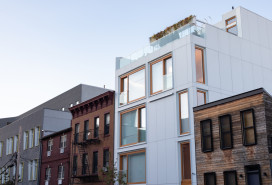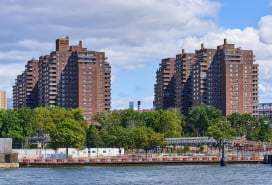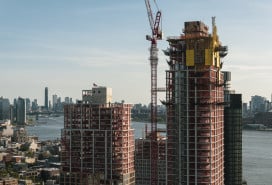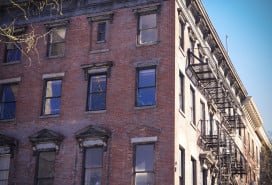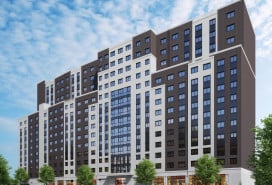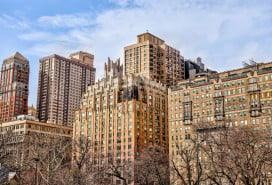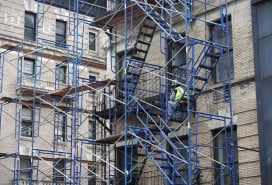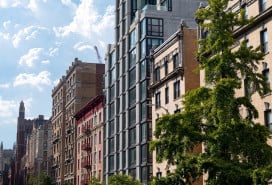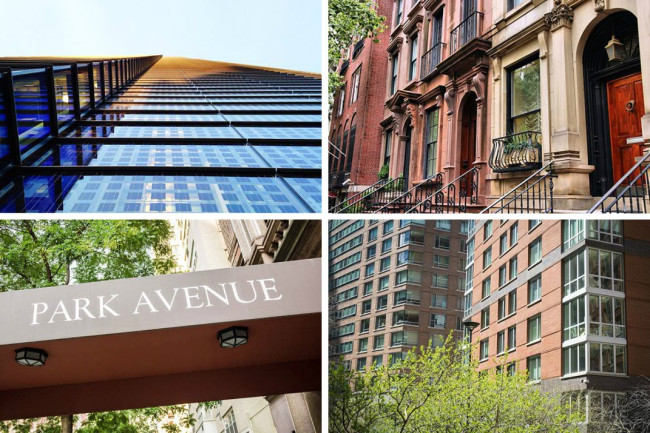Brick Underground's 2018 Market Forecast: Tax uncertainty, ultra-luxury prices perk up, mortgage rates remain low

iStock
The past year was marked by political upheaval on the national stage, but for much of that time the seismic shifts in D.C. weren't directly felt in the New York City real estate market. Now, though, following the Republicans' dramatic year-end tax reform package, that's likely to change. How exactly is unclear, and as we'll discuss shortly, is likely to vary widely depending on your specific location and financial situation.
The nitty gritty of how the tax overhaul could play out in New York housing takes up a sizable portion of our attention here, but other trends are likely to be familiar to anyone who's kept up with city real estate in recent years: rent concessions and price cuts have defined the new development in the upper echelons of the rental and sales markets and are likely to continue as new condos and luxury rental projects continue to finish construction, adding to a market already flooded with comparable apartments. Similarly, the L train shutdown isn't scheduled to begin until 2019, but it has taken up a lot of oxygen in real estate discussions since it was revealed as a possibility in early 2016. In the coming year, though, New Yorkers could see some of the first direct effects of the shutdown on rents.
It's an old truism that real estate is all about location, but location is a relative concept, which depends in large part on transportation. The L train shutdown is a dramatic example of how transportation is not an immutable variable in the real estate equation. Proving this point further elsewhere in the city, new ferry docks and Citi Bike stations have changed the commuting calculus for tens of thousands of New Yorkers, and may affect prices in 2018.
Here, without further ado, are the big stories we're watching out for in the coming year.
A year of uncertainty
Location may be a bedrock factor in determining real estate prices, but the operative word in looking forward to 2018 is "uncertainty," says appraiser Jonathan Miller of the firm Miller Samuel. "That's sort of the overview of the condition we're in."
A large portion of that uncertainty, according to Miller and other real estate industry pros we spoke to, comes from the GOP tax bill. The legislation is far-reaching, with specific provisions that have drastically different effects depending, for example, on whether you own or are buying a home, whether that home is worth more or less than $750,000, whether you're buying with a mortgage or with all cash, what form your income takes, and much more. In general, though, the changes favor the very wealthy more than the working and middle classes, and even the merely rich.
And similarly, as Miller says, "So much of the tax bill is going against the theory of homeownership and going for being a landlord or an investor."
Triplemint's Off-Market Advantage
Discover off-market properties in your ideal neighborhood that perfectly suit your needs and budget. Meet and deal with sellers before their apartment hits the market.


Let Triplemint's off-market team give you exclusive access to apartments in your price range and desired neighborhood that no one else has seen. More options, less competition, no bidding wars.
That said, given the hasty way that the bill was passed, with even legislators who voted for the final version acknowledging that they hadn't read the whole thing, Miller predicts, "We're going to keep uncovering things and finding things out in 2018."
The most obvious standout features of the legislation for New York homeowners are that it limits your state and local tax deductions, including property taxes, to $10,000, and lowers the limit on mortgage interest deductions from $1 million to $750,000. Because New York's city and state taxes are high relative to the rest of the country, and because the city's property values are among the highest in the nation, these changes will mean bigger tax bills for homeowners and buyers, and especially those who own or are buying larger and/or well-located apartments and houses, and those taking out big mortgages. Researchers at Moody's Analytics predicted that the higher tax burdens spurred by an earlier version of the tax bill with similar provisions could decrease sale prices in Manhattan by nearly 10 percent, and even more in high-tax Westchester County and New Jersey.
Miller says that the general idea that prices could go down in those places makes sense, but he and other experts we spoke to weren't ready to fully embrace the prediction of a double-digit decrease. Another possible counter-balancing effect could come from boosted stock prices, Wall Street bonuses, and corporate profits.
"This is widely believed to be seen as this is not good for states like New York," says Halstead president Richard Grossman. "However if there’s a bright side to something, there’s a lot of people who feel this will be good for the financial markets. The financial markets affect our housing pricing and our local economy."
How exactly remains to be seen, but the decade since the start of the Great Recession, in which wages stagnated as corporate profits recovered, apartment sales prices and rents soared, and developers focused largely on high-end development, could be instructive.
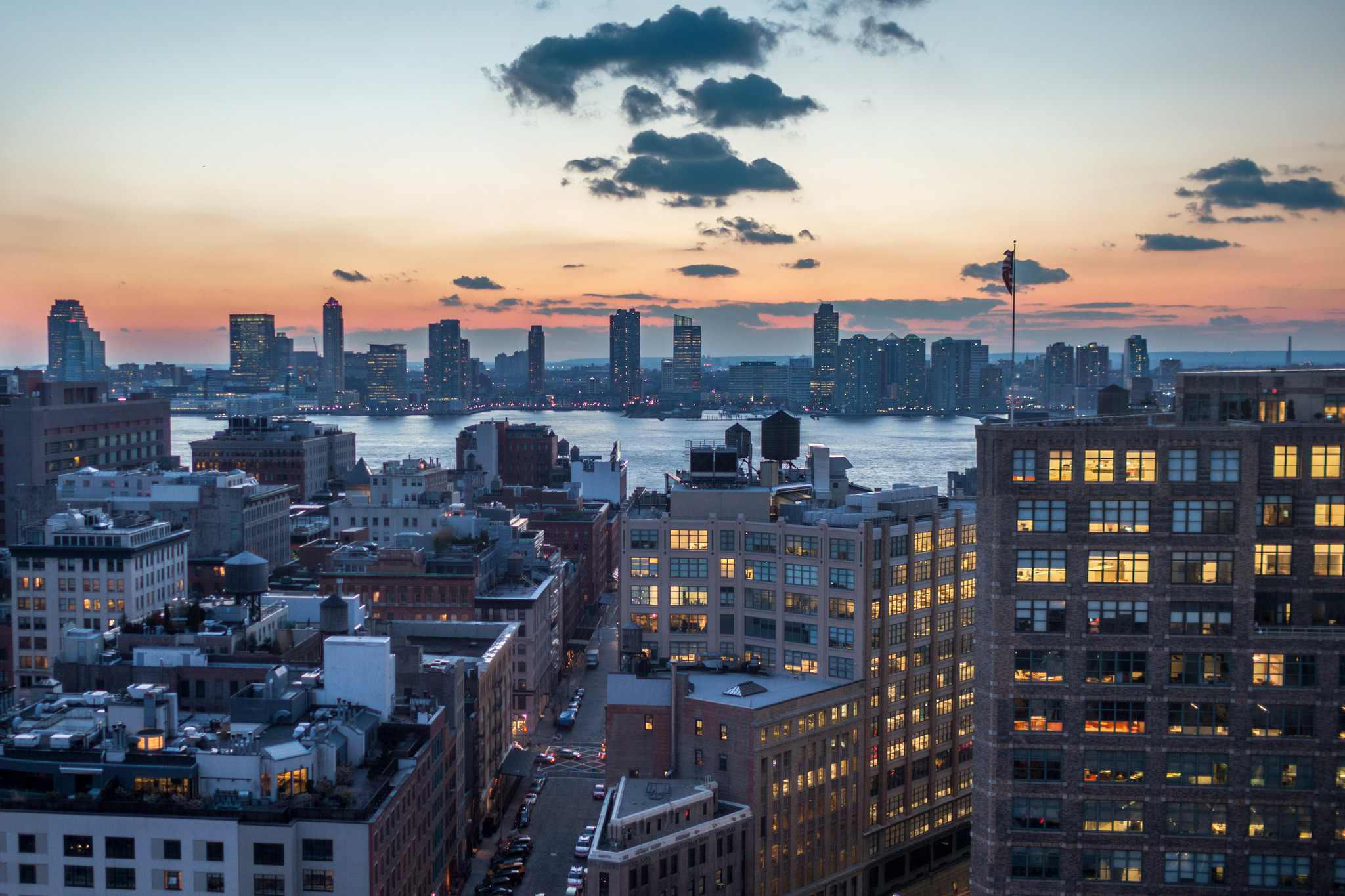
Good news for some high-end sellers
People with the highest incomes, corporations, heirs, and real estate investors all get tax breaks under the Republican tax bill. Meanwhile, hedge funders afraid that the lower tax rate they enjoy on income that's called carried interest ultimately convinced lawmakers to leave it alone. For this cohort, many of whom were waiting to see what the new presidential administration would mean for their finances before making big purchases, the uncertainty is over.
That's according to Darren Sukenik, a broker for Douglas Elliman who says he deals mostly with all-cash sales in lower Manhattan worth more than $2 million.
"I’m watching out for dancing in the street," Sukenik says about his 2018 outlook. "My clients are jubilant about the tax bill. They're mostly cash buyers. They’re completely unaffected by the change in tax deductibility. The mortgage deductibility is more of a single-family home buyer and suburbs buyer issue."
Tyler Whitman, a real estate broker at Triplemint (a Brick Underground partner) who deals largely with properties in the $2-$5 million range, also predicts that the one percent will be buying in 2018.
"We’re seeing a lot of big contracts getting signed. The tax bill is the talk of the industry right now," he says. Contrary to the general industry belief that the tax bill will hurt New York real estate sales, "I think the super wealthy are going to save hundreds of thousands of dollars in taxes... They’re not going to care so much about real estate deductions because they have so much other money to work with. I think the super luxury market is going to begin to move again."
Sukenik explains that top-end sales activity may have slowed down lately, but it's not for lack of interest.
"It’s much like waiting to get into a hot club and people are behind a velvet rope," he says. "People don’t not want to buy an apartment in Manhattan. They just don’t necessarily pull the trigger in a market that’s shifting."
Now, he says, "There's no more uncertainty. There's a specific group of people who got exactly what they wanted. Those happen to be Manhattan buyers."
This is likely to portend rebounding prices at the top end, brisk competition for prime apartments, and luxury listings spending less time on the market. Encouraging predictions for multimillion dollar sellers in Manhattan, and a message to big-ticket buyers to get in early, before prices spike.
Rising prices for renters and buyers beyond the luxury market
Outside of the city's glossy new towers, sale prices and rents are likely to continue their climb. This is bad news for the bulk of renters and buyers, whose median income of $53,000 is barely above what it was a decade ago, adjusted for inflation. More than half of New Yorkers pay more than 30 percent of their income in rent, and to afford a typical house or apartment not just in the city but in the metro area broadly defined, households have to make six figures.
Grant Long, senior economist for StreetEasy, says that part of what's driving the ongoing price increases is the continued influx of newcomers, young professionals competing for well-compensated jobs among them. Tax bill or no tax bill, he doesn't see that changing.
"Young computer science grads are not going to move to Houston rather than New York City" as a result of the tax bill, he says.
"Your average priced co-op or condo is still moving. Your time on market for anything under $1.5 million is still moving," says Zachary Elias, rental manager for DJK Residential. "People want to buy. It’s still New York."
As a general rule of thumb, your ability to get concessions as a renter or a discount as a buyer decreases, and competition gets stiffer, as you move down in price. Apart from some housing lottery apartments included in big new luxury complexes, and the series of mayor-directed rezonings that critics argue will do little to address existing needs, the development boom of the past several years has not included a substantial number of apartments geared toward the working or middle class, and that shows no sign of changing in 2018.
This is good news for sellers in further out New York City neighborhoods, who, barring an economic downturn, can probably count on continued price increases, slower and steadier in neighborhoods that aren't seeing a lot of change, and more dramatic in neighborhoods undergoing rezonings, new construction, and/or an influx of professionals. For more on where prices have gone up a lot over the past five years and where they're poised to increase most next, see our guide here, as well as StreetEasy's 10 neighborhoods to watch in 2018.
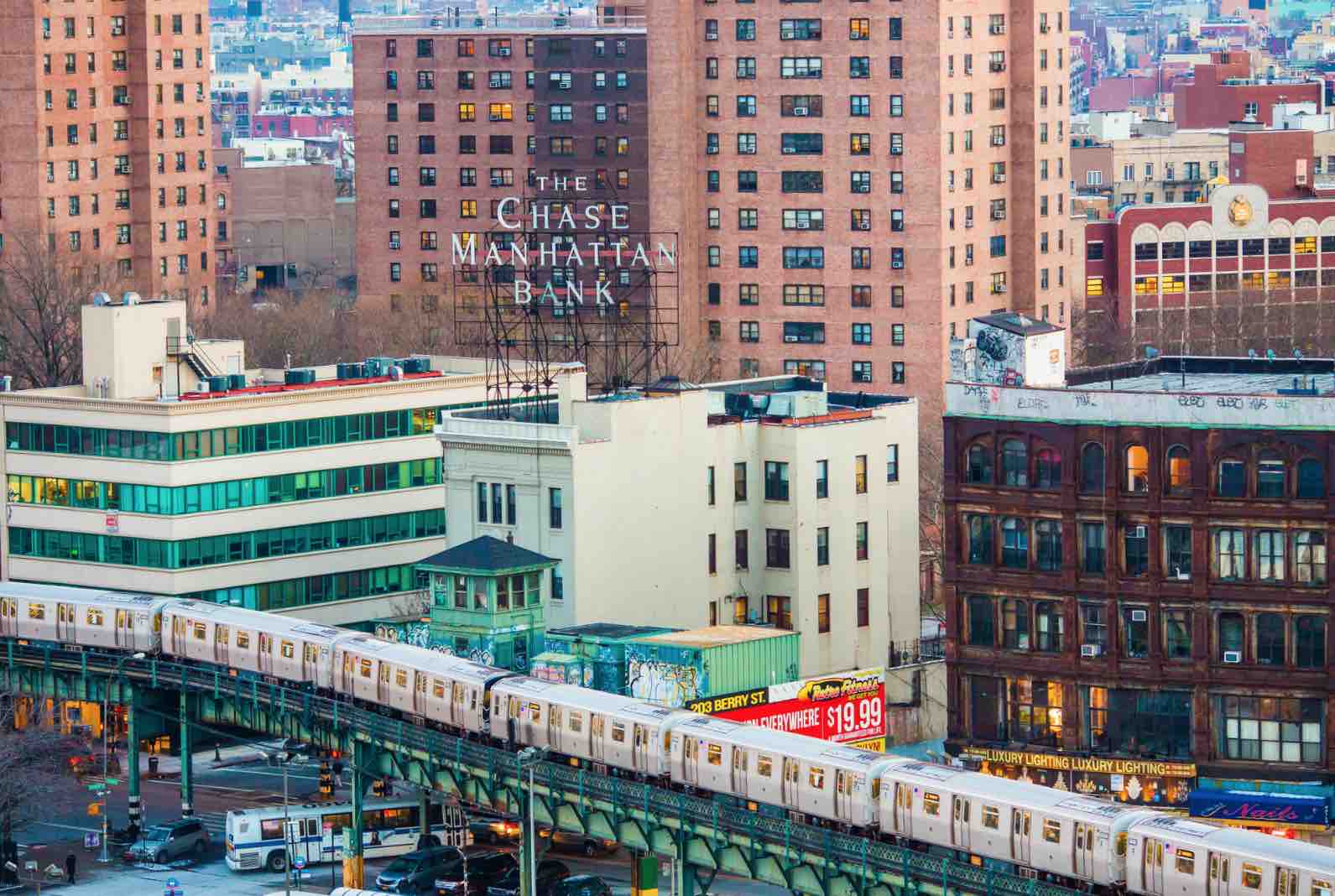
Outer borough/non-luxury homeowners and buyers could feel the tax bill's effects more, even though the mortgage change affects them less
The decrease of the mortgage interest deduction to $750,000 doesn't affect homeowners' existing mortgages, which are grandfathered in under the new tax law, and given that many of the houses and apartments outside Manhattan cost less than that, the change won't impact quite so many homes in the outer boroughs as in Manhattan, where the median sales price is $1.17 million. Still, people in the parts of the city outside Manhattan largely have lower incomes, and more people work regular, wage-based jobs. As a result, the new limit on state and local tax deductions will mean higher property and income taxes for many outer borough and upper Manhattan residents who are working- and middle-class, particularly homeowners, since property taxes are included in the $10,000 deduction limit.
For example, if in 2018 (the tax changes don't apply to your upcoming April filing) you are single, earn $100,000, pay $6,500 in interest on a $350,000 mortgage on your co-op, and pay $11,500 in property taxes, you can deduct the mortgage interest, but the local income and property tax deduction combined will be capped at $10,000, and you will owe $14,330 in federal taxes, according to Market Watch's Trump tax calculator. This is more than $1,000 up from the $13,290 that Koreen Jervis of Korjé Tax Professionals calculates that the same person would pay before the new rules go into effect.
For more back-of-the-envelope math, the New York Times has a similar tax calculator without the homeowner variables, but of course everyone's situation is different, and the only way to really know what the tax bill means for you is to consult with an accountant.
As for the impacts on buying and selling, "For property owners in the outer boroughs it’s difficult to say how things will shake out," Long says.
The National Association of Realtors, a lobbying organization, says the decreased mortgage interest deduction could cause home prices to fall, but that it may also tighten inventory, because some would-be sellers may want to hold on to the benefits of the previous mortgage tax rules. Appraiser Jonathan Miller agrees.
The mortgage interest deduction changes "apply to new mortgages, so if you already have a mortgage, it's sort of dis-incentivizing mobility," he says. "That means tighter inventory in lower price strata, which means lower affordability, more price pressure."
Beth Gittleman, head of sales for Bohemia Realty Group, which focuses on uptown Manhattan and to a lesser degree adjacent neighborhoods in the Bronx, predicts, "Upper Manhattan will remain strong" sales-wise, "because property taxes are less up here. The write-off on the mortgage is less because the mortgages are smaller."
Translation: If you're looking for a place for under $1 million in the outer boroughs or under $1.5 million in Manhattan, fewer sellers may be offering up their apartments, so prices and competition for those that are listed are likely to increase. If you're looking to sell and buy another place in New York or New Jersey, be aware of the new tax calculus, and consult with a professional on how it should inform your asking price and your purchasing budget.
Wage earners buying apartments for less than $750,000 may be less affected in dollars and cents by the state and local tax deduction reduction, but for middle-class buyers, each of those dollars counts more proportionally than for their well-heeled neighbors in the city. Still, none of the professionals we talked to thought the impact would be enough to actually drive these prices down.
Expect mortgage rates to remain historically low
The interest rate for a 30-year fixed jumbo loan on a New York co-op or condo is 3.75 percent according to Robbie Gendels, vice president and loan officer for National Cooperative Bank (a Brick sponsor), and for a 5/1 adjustable rate mortgage, 3.5 percent. These are basically in line with where mortgage rates were at the beginning of the fall, and though they're "the highest they've been in a while," the rates are still some of the lowest in over 50 years.
A recent Federal Reserve rate increase isn't expected to directly impact mortgage rates in the short term.
"What can affect mortgage rates is changes in the Fed’s forecast," StreetEasy's Long says. "The tax bill pumping a lot of money into the economy and forcing the Fed to respond, to raise rates to keep the economy from growing too fast to control, that could lead to a mortgage rate increase."
On the other hand, he adds, "The only way we foresee mortgage rates going down is in the case of an economic slowdown. Since 2010, we've had the largest expansions in modern history. You can expect that to slow at some point, and then you can see mortgage rates fall."
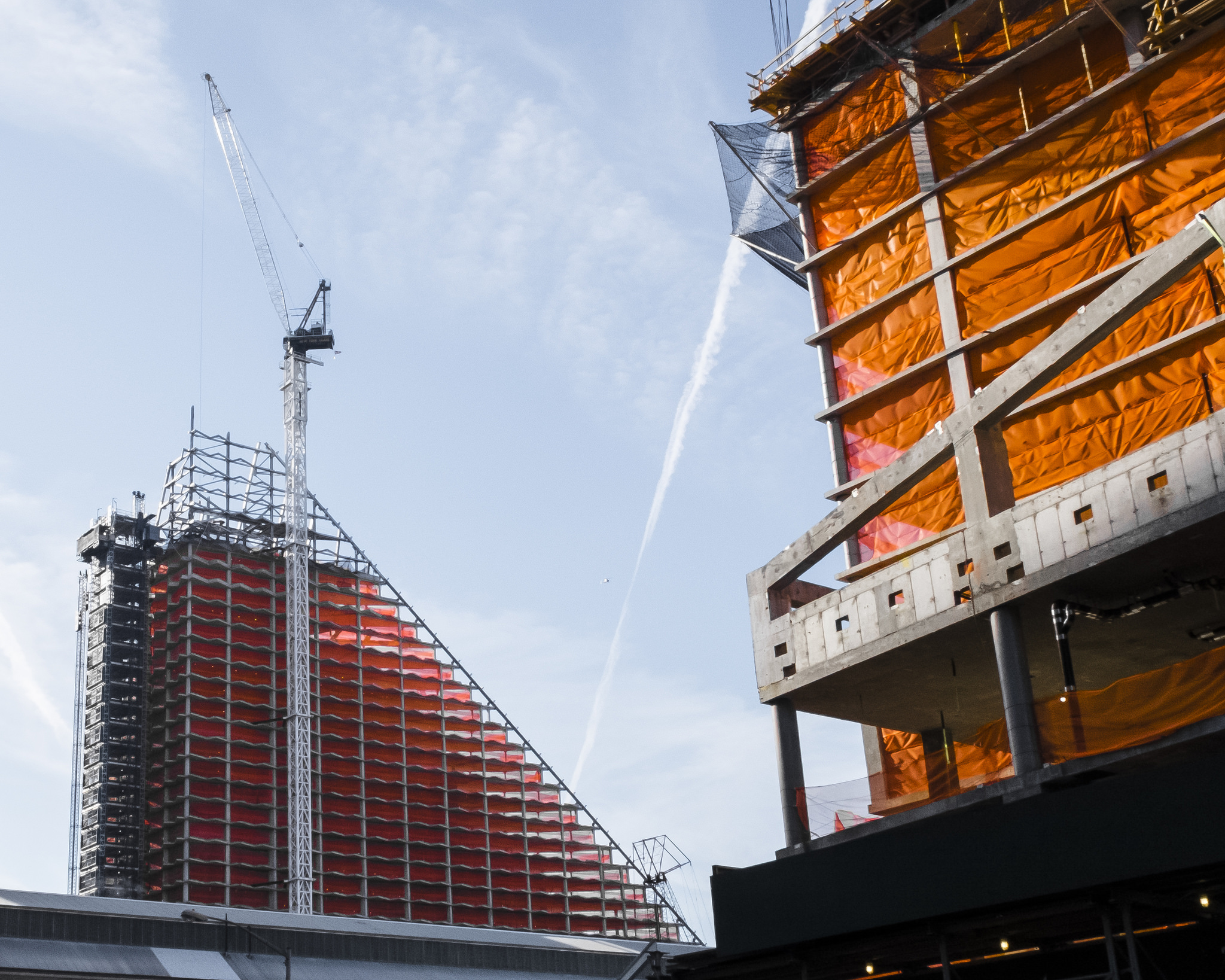
Continuing deals on high-end, new-construction condos
Manhattan median sale prices have been drooping since last year, a phenomenon observers say is driven by lackluster interest in new development luxury condos that have been flooding the market in recent years, as well as the smaller size of the apartments coming up for sale lately compared to those built from 2011-2014. The median sales price for new development apartments in the third quarter of 2017 was $2.8 million, down from $3.63 million the year prior, and the average sale discount in the borough was 5.5 percent, up from 2.9 percent in 2016.
Approximately 2,800 new apartments were expected to hit the market in 2017, according to the New York Times, and more is on the way in 2018, much of it high end.
"I think new development is getting oversaturated," says Triplemint's Tyler Whitman. "It comes at such a premium price tag compared to the rest of the market. It’s only new for a couple of years. Buying in a new development right now is a bit like buying a car: it loses value as soon as you buy it."
The tax package's impact on the tax burden of high-price properties is likely to dovetail with the problem of over-supply and further hurt prices for new development, Miller says.
The aforementioned enthusiasm of ultra-wealthy buyers could turn the tide somewhat, but brokers point out that many new luxury projects are being built relatively far from transit, and say that the less distinguishable from other apartments on the market a unit is, the less competitive its pricing will be.
So for example, "Hudson Yards is a big question mark to me," Sukenik says, referring to the city-within-a-city being built on the far west side of Manhattan. Despite the development's location around a new 7 train station, the 4,000 apartments it includes and the lack of an established neighborhood around it makes it unclear that the condos there will fetch the prices the developers are after when they come online.
"That would concern me," Sukenik says of all the variables.
By contrast, he says that the neighborhoods he specializes in such as Greenwich Village and Tribeca are proven, each with a lot of distinctive apartments, and not a lot of new ones coming anytime soon.
"The safety" price-wise "is always in A-plus neighborhoods," he says.
"People certainly like unique," Halstead head Richard Grossman says. "People like well-located property."
Luxury renters likely to find deals, too
A similar glut of high-end rental buildings has driven many months of rising concessions, and even, lately, actual rent decreases in new development and Manhattan doorman buildings. This trend is likely to continue, at least for part of the year, according to those we spoke to.
"There’s certainly an abundance of supply, and new product is hitting the market every day," Elias says. "I don’t see that gap being filled at least through mid-next year."
The availability of rent concessions and possible rent breaks is especially pronounced in neighborhoods that have an abundance of new construction, such as Downtown Brooklyn and Long Island City, Elias says.
"I see softening across the market in 2018, with potentially some falls in rents in the high end of the market, particularly in neighborhoods that have seen a lot of construction," he says. "We do not expect to see concessions going away as rents fall. So if a unit is offering two months free and $3,700 for a one bedroom, they're going to offer $3,600 and two months free."
Halstead's Grossman says that he has seen renters becoming excited by continued news about the availability of concessions, and hitting the limits of what they can ask for.
"I think renters are reading about this and some of them are getting emboldened as well," he says. "Some of the things I’ve seen people asking for are very bold—three months free plus a lower rent. I don’t necessarily see them getting that. Some of the tenants are coming and asking for a lot. A lot of owners say, 'Listen, there’s a limit to where I’m willing to go. I’d rather keep it vacant and look for a different tenant.'"
The way the market is going, if you're renting and staying where you are, it couldn't hurt to ask your current landlord for a break when lease renewal time comes around.
"If you are negotiating a lease ask for something," StreetEasy's Long says. "If you are being offered something, ask for more. It’s been a while since the market favored rent in this way. Which isn’t to say that everything’s a bargain."
Transit changes will continue to buffet rental and sales prices—for better and worse
The prevailing wisdom on the L train shutdown is that it will most affect Williamsburg, parts of which rely on that subway line exclusively; that there might be some minor downward sales price adjustments, but nothing too pronounced because the shutdown is temporary; and that concessions and other rent deals are likely to accompany leases that overlap with the 16-month estimated East River tunnel closure period, which starts in April 2019. Also, brokers and analysts say rents are likely to rise in neighborhoods served by nearby train lines such as Greenpoint, Bushwick, Bedford-Stuyvesant, and Ridgewood.
Still, some owners may be unable, for whatever reason, to wait till the shutdown is over to sell, and buyers looking for a slight value might get some leverage by shopping during the big repair job (transit officials hope to staunch the commute bleeding with dedicated bus lanes and new shuttle routes over the Williamsburg Bridge).
"The L train shutdown will effect Williamsburg negatively, so buyers can be opportunistic there," says Compass broker Ian Slater.
On the flip side, Slater sees "lots of room for appreciation" left on the far Upper East Side in the wake of the recent arrival of the Q train extension along Second Avenue.
Similarly, the addition of Midtown and Wall Street ferry service to new parts of Brooklyn and Queens in May have increased rents in the largely transit-starved areas near the new ferry docks, according to a StreetEasy report. The site's researchers found that rents rose about 1.5 percent faster within a 10-minute walk of the Atlantic Avenue, Greenpoint, and Astoria ferry stops when compared to the larger surrounding neighborhoods. Smaller data samples suggested possible similar effects in Sunset Park and Bay Ridge, whereas already premium-priced Dumbo, Williamsburg, and Long Island City were the scenes of no such localized spikes.
Gary Malin, president of Citi Habitats, says that the Greenpoint ferry is "a huge selling point'" for The Greenpoint, a luxury condo building at the end of India Street, a 10-minute walk from the nearest G stop, but steps from the dock that was built in anticipation of waterfront development in the area.
The addition of Citi Bike stations to Harlem, Long Island City, Astoria, Crown Heights, and Prospect Heights, is also supposed to have been completed by the end of 2017, bringing a more granular but not insignificant layer of commuting options to the mix.
You Might Also Like

